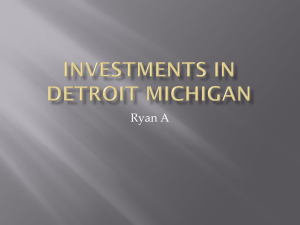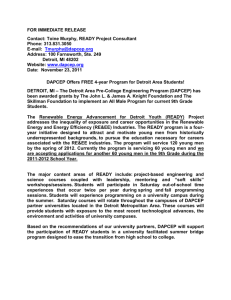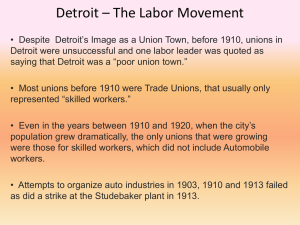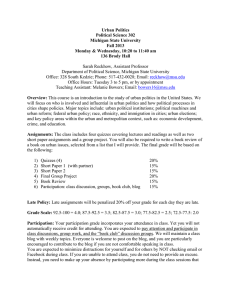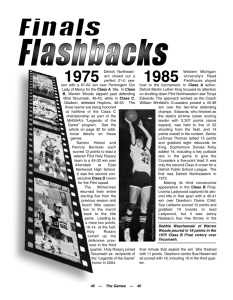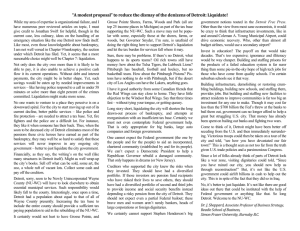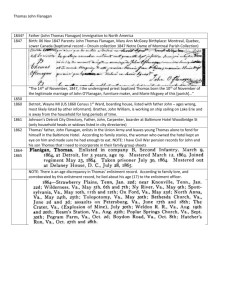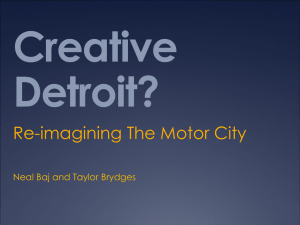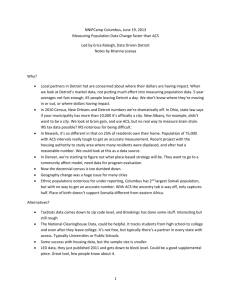Anna Flegler: Detroit, the Auto Industry and Globalization
advertisement
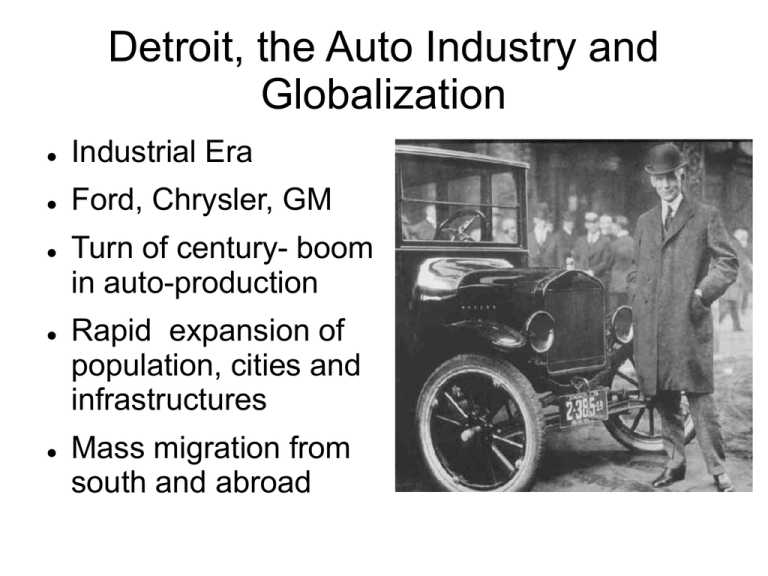
Detroit, the Auto Industry and Globalization Industrial Era Ford, Chrysler, GM Turn of century- boom in auto-production Rapid expansion of population, cities and infrastructures Mass migration from south and abroad The Road to Organized Labor "The UAW would organize Ford over my dead body." -Henry Ford UAW- 1935 Detroit Flint sit-down Strike 19361937 (GM) Battle of the overpass 1937 (Ford) Sit-down strike, unionization 1937 (Chrysler) 500,000 members 1941, Ford workers win right to unionize WWII, no UAW “no strike' pledge 1946-1970 1.5 million members Negotiated wages far above market rates for unskilled workers Effects of 73' oil embargo Membership is now around half a million Decline in wage and benefit concessions, less influence of union Example: average worker costs car companies 70-75 dollars an hour (2002) Debate: Some blame UAW for the loss of jobs in the area Detroit Riots "...We must come to see that de facto segregation in the North is just as injurious as the actual segregation in the South." -Martin Luther King Jr., Detroit, 1963 Detroit Race Riot 1943 12th Street Riot 1967 Issues behind riot: discrimination, housing, black unemployment rates, white flight, chronic police brutality White Flight Middle income white families flee to suburbs (started in 50's) Issues: commuting (traffic, road systems), socioeconomic segregation, sprawl, urban decay 70's and 80's Oil embargo (73) Energy crises (79) foreign car makers gain market share Loss of 300,000 manufacturing jobs Competition from foreign car companies 1970's Oil Shortage Average fuel economy 1973: 13.4 Miles a gallon!!! (21.5 Km for 3.8 liters!) Gas shortage: drastic measures taken by government to curb oil usage Which car would you rather drive during a time of gas shortage? Flint and Lansing- Sister cities Many factories of the big three located in these nearby cities Have experienced similar issues Plight of Flint shown in Michael Moore's film “Roger and Me” 1990's Role of technology in manufacturing, foreign producers more efficient Wages and benefits still high But: increasing competition from foreign and domestic producers Southern US: less unionization and hence lower wages Current Statistics 8.5% unemployment (2007) Severe urban decay, ultrarich suburbs 80% in Detroit city black, majority of suburbs white Detroit: most dangerous US city, Flint is 7th (Morgan Quinto press) Houses now selling for less than cars (less than 10,000 ) Winner of most miserable city in US (Forbes Misery Measuree), Flint is a close 3rd place Reputation: Murder capital of the country (1980's, [ FBI crime statistics ]) Population loss of 1 million since 50's Urban Prairie Urban Prairie Future of Detroit and Auto industry Unionized workers= unlikely that manufacturing jobs will return Globalization process will not reverse Detroit as “the last American city” Urban revival projects in community
